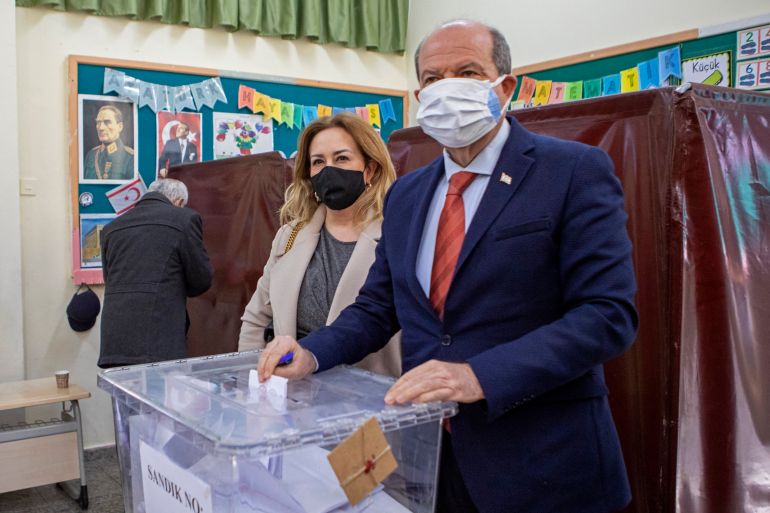Pro-Ankara UBP wins majority in Turkish Cypriot polls
UBP will have to form a coalition to govern the breakaway state, which has been hit by COVID-19 and the Turkish currency crisis.

A right-wing nationalist party has won the majority of Turkish Cypriot votes in snap legislative elections in the breakaway northern part of Cyprus, according to the final results released by the election commission.
The National Unity Party (UBP) of right-wing nationalist Ersin Tatar, a close ally of Turkish President Recep Tayyip Erdogan, won 39.5 percent of the vote, strengthening its presence in the parliament of the self-declared Turkish Republic of Northern Cyprus by taking 24 out of 50 seats.
Keep reading
list of 4 itemsTurkey’s Erdogan says Cyprus mosque attacks won’t go ‘unanswered’
Cyprus appeals to UN Security Council over Varosha reopening
Cyprus talks can only resume on a ‘two-state’ basis, Erdogan says
As in 2018, the pro-Ankara UBP will have to form a coalition to govern.
The centre-left Republican Turkish Party (CTP) came second with 32 percent of the vote to take 18 seats.
Economy in focus
The self-proclaimed TRNC, which is recognised only by Ankara, has been hit hard by the COVID-19 pandemic and Turkey’s economic crisis that has seen the value of the Turkish lira plummet.
The lira shed 44 percent of its value against the dollar last year, driving up prices and exacerbating decades of economic isolation imposed on the north.
Cyprus has been split since 1974 when Turkish forces occupied the northern part of the island in response to a Greek-inspired coup attempt.
The UBP favours a two-state solution while the CTP urges a settlement with the Greek Cypriots.
But unlike previous Northern Cypriot elections, campaigning this time focused on the territory’s economic woes rather than any talk of a solution to the split.
Hopes of resolving the intractable dispute suffered a setback when UBP’s Tatar pulled off a surprise, narrow win over pro-unification candidate Mustafa Akinci in the TRNC’s 2020 presidential election.
Tatar has pressed for international recognition and insisted on a two-state solution at UN-brokered talks on ending the division.
His stance was flatly rejected by the majority Greek-speaking Republic of Cyprus, a European Union member with effective control over the southern two-thirds of the island.
The Erdogan administration was accused of interference in Northern Cyprus’s presidential election in 2020, sparking resentment among many Turkish Cypriots.
Negotiations to resolve the Cyprus problem have been suspended since 2017.
Attempts by the UN, which controls the buffer zone separating the Turkish-speaking north and Greek-speaking south, to revive negotiations in April 2021 ended in failure.